Exploring Dubai: The Pinnacle of Luxury and Culture
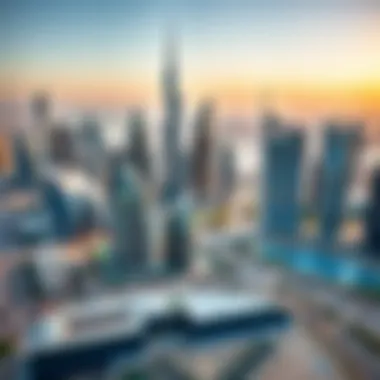
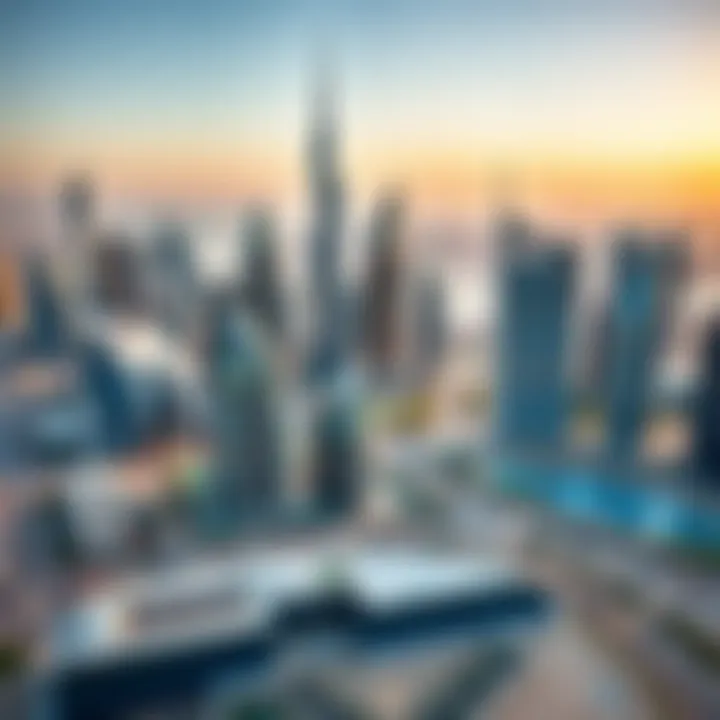
Intro
Dubai is often painted as a canvas of opulence and advancement, a bustling metropolis where the extraordinary meets the everyday. Nestled within the United Arab Emirates, it has become a narrative of daring ambition and rapid evolution. This is where traditional values and modernity cling to each other like two sides of the same coin. As one strolls through the streets, one can’t help but feel the pulse of a city that’s constantly reinventing itself.
The allure of Dubai extends beyond its magnificent skyline, dotted with skyscrapers like the Burj Khalifa, the tallest building in the world. It’s a city that encapsulates a myriad of cultures, offering a blend of experiences from around the globe. The economic landscape here is booming, attracting investors and expatriates alike, eager to participate in this vibrant marketplace.
In this discussion, we will delve into the core elements that contribute to Dubai's fame, dissecting its architectural masterpieces, evaluating the richness of its cultural diversity, and exploring the unique nature of the real estate sector. We aim to provide valuable insights for investors, buyers, and anyone enticed by the city’s ever-evolving story.
Market Trends
Beyond the luxuries, one cannot overlook the evolving market trends that are vital for understanding Dubai's real estate allure. From soaring property prices to the future forecasts that sprinkle optimism, the market is a pulse point for investors and analysts alike.
Current Property Prices
Currently, property prices in Dubai present a mixed bag, as different areas are experiencing varying degrees of demand. For instance, luxury developments in the Palm Jumeirah and Downtown Dubai continue to attract high-paying buyers, pushing prices per square meter sky-high. Meanwhile, properties in emerging neighborhoods like Al Furjan offer more affordable options for first-time buyers.
- Luxury Properties: Average prices hover around AED 1,500 per square foot in prime locations.
- Mid-Range Areas: Expect something in the ballpark of AED 900 in neighborhoods like Jumeirah Village Circle.
- Affordable Segments: Prices can dip to AED 700 in up-and-coming districts.
As the demand fluctuates, buyers must stay attuned to the market’s whims. To keep a keen eye on ongoing trends, resources like Dubai Land Department provide timely updates.
Future Forecasts
Projections for Dubai's real estate market suggest a steady climb. Analysts estimate that properties will appreciate by 5-10% annually in the next few years due to increasing interest from foreign investors. Factors such as upcoming events, including the Dubai Expo, fuel this optimism as they attract tourists and potential expatriates, leading to increased demand for both commercial and residential properties.
"With the transformation shaped by rapid economic growth, Dubai is not just keeping up with the world; it's setting the pace."
Investing here offers not just financial gains, but also the chance to partake in a city defined by its diversity and aspiration.
Investment Opportunities
As we look closely at investment opportunities in Dubai, we uncover a treasure trove waiting to be explored. Unlike many global cities, the ease of doing business here is commendable, offering a conducive environment for seasoned investors and newcomers alike.
High-ROI Areas
Certain districts in Dubai stand out for their potential return on investment. Places like Dubai Marina and Jumeirah Beach Residence see high occupancy rates coupled with lucrative rental yields. Investors often report returns between 7-9%, making these areas attractive for those looking to maximize profitability.
- Dubai Marina: Known for its scenic views and accessibility, it's a hotspot for the high-end rental market.
- Downtown Dubai: Offers prestige and prime location, albeit at higher entry prices.
- Jumeirah Village Circle: A growing community that appeals to families and young professionals alike.
Financing Options
Funding your Dubai property can be facilitated through various avenues. Many banks and financial institutions offer competitive mortgage rates for expatriates, making it an attractive option for those looking to secure a property without draining their savings pool.
Some relevant banks to consider include:
- Emirates NBD
- RAK Bank
- FAB
Understanding these trends and investment landscapes equips potential buyers and investors with the necessary tools to navigate this diverse market, ensuring their ventures are as rewarding as they are fulfilling.
Prelims to Dubai's Global Significance
Dubai, often taken by the world as a mere destination for luxury travelers, is actually a beacon of global interconnectedness. Over the past few decades, it has transformed from a small fishing village into a bustling metropolis, taking significant strides in establishing its significance on the global stage. This city is not simply a mere melting pot of cultures or an architectural wonder; Dubai serves as a crucial junction of trade, tourism, and investment, drawing visitors and investors from all over.
It's important to understand that Dubai's global significance goes hand in hand with its cultural richness and economic dynamism. The geographical location of this city places it at the crossroads between the East and West, making it an ideal hub for businesses to operate globally. For investors and analysts, this points to not just current opportunities, but long-term potential that only a few cities can boast of. The diversity in Dubai's population, with over 200 nationalities calling it home, further enriches its global fabric, creating an environment ripe for cultural exchange and innovation.
In the context of this article, it’s essential to highlight several key elements illustrating why Dubai stands out:
- Strategic Location: Major flight routes and shipping lanes converge here, simplifying global logistics.
- Economic Incentives: The government has established favorable regulations, including tax exemptions for businesses, making it an attractive market for foreign investors.
- Cultural Vibrancy: Various festivals and events throughout the year cater to diverse tastes, showcasing the unique heritage of its inhabitants.
- Thriving Tourism: With extravagant attractions like the Burj Khalifa and luxurious resorts, the city attracts millions of tourists, providing a significant boost to its economy.
In essence, recognizing Dubai's global influence is crucial for understanding its appeal. For investors and expats alike, this city offers myriad opportunities that extend beyond the immediate and superficial, tapping into a complex network of cultural, social, and economic factors that foster growth and innovation.
"Dubai is not just a city; it’s a vision that underscores the importance of innovation and collaboration."
The significance of this city goes beyond the tangible luxuries; it beckons a future that continues to thrive on collaboration and growth. Through provisions of its regulatory frameworks and continual investment in infrastructure, Dubai's leaders have built a framework for sustainable development that ensures its reign as a global powerhouse well into the future. As we delve deeper into the different facets of Dubai, one can only marvel at how a seemingly inconspicuous desert city has successfully placed itself in the limelight of international recognition.
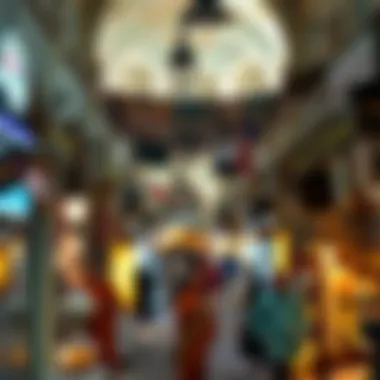
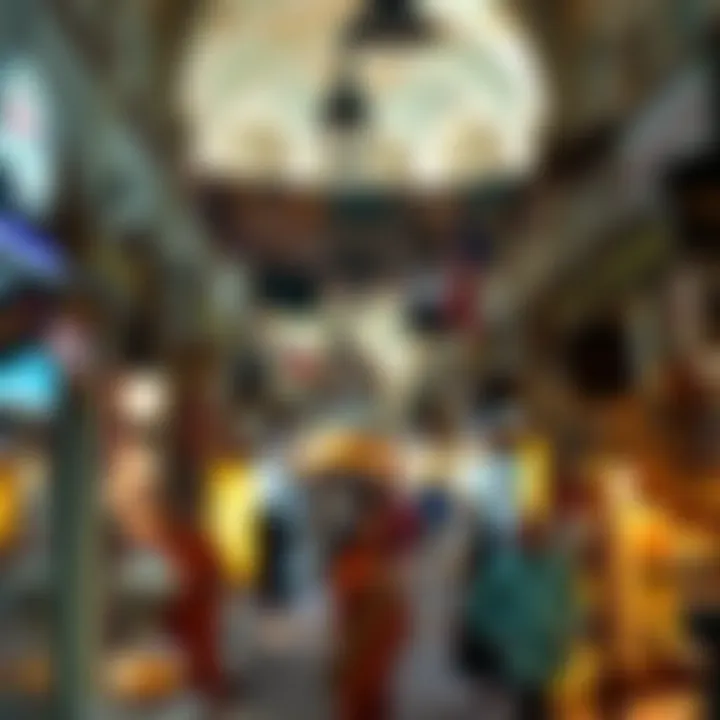
Architectural Wonders
Dubai's skyline is a canvas painted with a myriad of architectural masterpieces. These structures aren't merely buildings; they reflect the vision, ambitions, and the relentless drive of a city that aims to redefine urban living. Architectural wonders in Dubai play a significant role in attracting global attention, not only for their aesthetic appeal but also for their innovative engineering and cultural significance. The city doesn’t just build, it creates statements that resonate beyond the desert.
The blend of styles, materials, and functionalities in Dubai’s architecture creates an experience that is unique to the region. These wonders act as a magnet for tourists, investors, and expatriates, driving the economy and enhancing the livability of the city. The various elements, from sustainability practices to cultural expressions, woven into these structures, help frame Dubai as a global city that balances modernity with tradition.
The Burj Khalifa: A Pinnacle of Design
The Burj Khalifa stands tall, not just as the tallest structure in the world but also as a beacon of architectural ingenuity. Completed in 2010, this 828-meter needle piercing the clouds is a marvel of modern engineering. Designed by Adrian Smith of Skidmore, Owings & Merrill, the building incorporates a unique triple-lobed footprint inspired by the Hymenocallis flower. This design isn’t just for show; it enhances the building's performance in terms of internal airflow and wind resistance, a crucial consideration given Dubai’s climate.
Inside, the Burj Khalifa houses luxurious residences, corporate suites, and a premier hotel, the Armani Hotel. What sets this tower apart is not merely its height, but how it blends function, elegance, and sustainability. From its water-efficient landscaping to state-of-the-art cooling systems, the Burj Khalifa embodies a commitment to sustainability amidst luxury. This iconic structure not only enhances the skyline but also represents the essence of what Dubai strives to be—a pioneering leader in architecture and city planning.
The Palm Jumeirah: Engineering Feat
The Palm Jumeirah is another marvel, showcasing the ingenuity of human effort in architectural design. Designed to resemble a palm tree, this artificial island extends into the Persian Gulf with its fronds and trunk, creating waterfront living spaces that are unparalleled. The construction involved massive land reclamation efforts, where millions of cubic meters of sand and rock were meticulously placed to create this luxurious haven.
This man-made island hosts numerous high-end hotels, upscale retail spaces, and exclusive beach homes, establishing itself as a desirable location for the elite. Beyond its aesthetic allure, the Palm Jumeirah has become a significant contributor to Dubai’s tourism economy, bringing in millions of visitors each year who come to experience its opulence. The engineering behind this project sets a benchmark for future developments, proving that the limits of architecture can be pushed when creativity and technology unite.
Dubai Marina: Urban Planning and Aesthetics
Dubai Marina redefines the concept of urban living. It’s a meticulously planned waterfront community that spans over 2 miles along the Persian Gulf, featuring a stunning skyline of residential and commercial towers. The design encourages a walkable environment, filled with parks, open spaces, and a picturesque promenade lined with restaurants and shops. This part of the city reflects a harmonized lifestyle, where leisure meets luxury in a way few other urban areas manage to achieve.
The architecture in Dubai Marina showcases a blend of futuristic aesthetics and practical living. Towers are interspersed with communal areas and green spaces, ensuring residents enjoy a balanced lifestyle. Notably, the Marina is also home to several skyscrapers that challenge architectural norms, incorporating curvilinear forms that set them apart from traditional box-like structures. The successful integration of nature with luxury residential living illustrates Dubai’s commitment to enhancing life quality while retaining its reputation as a luxury destination.
The architectural wonders of Dubai capture the heart of its identity, fostering an environment where innovative design, cultural heritage, and luxury living coalesce beautifully. Whether through iconic structures like the Burj Khalifa, engineering marvels like the Palm Jumeirah, or the human-centric design of Dubai Marina, each facet reflects a broader narrative of ambition and possibility.
Cultural Melting Pot
Dubai’s reputation as a cultural melting pot cannot be overstated. The city is home to a myriad of nationalities and ethnic groups, each contributing their grains of culture to the dynamic dune of its societal structure. This makes Dubai not just a point on the map but a vibrant tapestry of human experience and interaction. Here, cultures intertwine like the threads of a richly embroidered cloth, creating a unique tapestry that leaves an indelible mark on every visitor and resident.
Diverse Population and Cultural Exchange
The beauty of Dubai lies in its diversity. As of recent counts, around 80% of the population consists of expatriates from various countries, including India, Pakistan, the Philippines, and the United Kingdom. This demographic dynamic fosters a unique environment where different languages, traditions, and perspectives coexist.
"Dubai is not only about skyscrapers and deserts; it’s about the people and their intricate interplay of cultures."
Such a blend promotes cultural exchange that is not superficial but deeply enriching. One can experience Diwali celebrations alongside Ramadan festivities in the same neighborhood, highlighting a collective respect and understanding among different communities. The fusion of traditions creates a richer social fabric, offering a sense of belonging that transcends geographical origins.
Art and Festivals: Celebrating Heritage
Art and festivals form the pulse of Dubai’s cultural landscape. The city hosts a variety of events that celebrate its rich heritage, such as the Dubai Shopping Festival, which not only promotes retail culture but also showcases local art and talent. Events like Art Dubai provide a platform for regional artists, further emphasizing collaboration across cultures.
Local galleries often serve as windows into the creativity that springs forth from this rich cultural soil. Artists draw inspiration from their surroundings, reflecting a blend of modernity and tradition in their works. The warm community spirit permeates these events, allowing for a greater appreciation of various forms of artistic expression. Festivals such as the Global Village bring together various cultures, showcasing crafts, food, and performances from around the globe, creating a festive atmosphere that fosters kinship.
Culinary Scene: A Taste of the World
Dubai’s culinary scene is yet another testament to its multicultural essence. The city has become a haven for food lovers, featuring cuisines that span all corners of the earth. You can savor every flavor from Emirati dishes like Al Harees to Filipino Jollibee, in a single day’s worth of indulgence.
New restaurants pop up each month, reflecting the latest global trends while often incorporating local ingredients. Places like the Dubai Food Festival offer a feast not just for the stomach but for the senses, with chefs and home cooks alike showcasing their culinary masterpieces.
Popular areas like Jumeirah Beach Residence or Downtown Dubai serve as epicenters for this culinary fusion, attracting both locals and tourists. This thriving food culture provides opportunities for entrepreneurship, particularly among expats looking to share their home-cooked recipes with the city. The taste of home can be found in nooks and crannies throughout the city, proving that Dubai perennially offers a table set for the world.
In summary, Dubai’s identity as a cultural melting pot stands as a testament to its global significance. Its diverse population, impactful festivals, and delicious culinary adventures not only attract visitors but also instigate ongoing dialogue and understanding among cultures, weaving new narratives into the city’s ever-growing legacy.
Economic Hub
Dubai's reputation as an economic hub is not just heard in whispers—it echoes across boardrooms and streets around the world. This city is a living testament to what it means to be a global player in the economic landscape. Nestled between the east and the west, Dubai has become more than just an oasis in the desert; it’s a bustling center for trade, finance, and innovation.
Business Environment: A Global Player
The business environment in Dubai is crafted to attract investments and facilitate entrepreneurial endeavors. With zero income tax and various incentives for foreign investors, it's like a beacon for those looking to make their mark. The Dubai Free Zones offer a business-friendly regime, allowing 100% foreign ownership, which is a rarity in many places.
Another pivotal element is the ease of doing business—registering a company can be done in a matter of days, rather than months. Additionally, the government’s commitment to fostering a pro-business environment has led to a robust regulatory framework that supports growth and innovation.
Moreover, Dubai's strategic location allows companies to access emerging markets in Africa, Europe, and Asia with ease. Airlines like Emirates have put this city on the map, literally opening doors not just for goods but for ideas and collaborations.
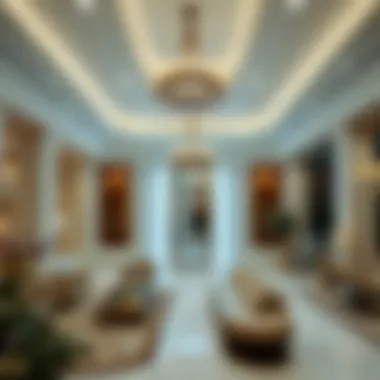
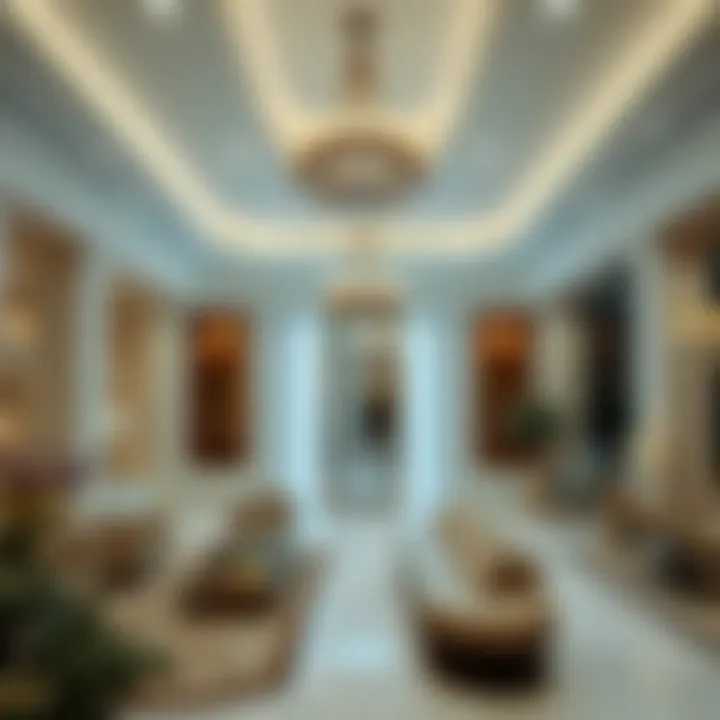
Key Industries: Driving Growth
The heartbeat of Dubai's economy can be found in several key industries that fuel its growth. Among these, tourism, real estate, finance, and technology play significant roles.
- Tourism: With attractions like the iconic Burj Khalifa and world-class shopping malls, tourism remains a top revenue generator.
- Real Estate: Dubai's skyline continues to evolve, with new luxury developments cropping up regularly, appealing to both investors and residents.
- Finance: Home to the Dubai International Financial Centre, the city sets the stage for international banking and insurance operations.
- Technology: The recent push toward technological innovation, particularly in areas like fintech, is making waves, attracting entrepreneurs and investors alike.
These sectors create a diverse economic base, cushioning the city against global downturns or fluctuations, helping it weather storms that may affect other regions.
Tourism Sector: Attracting Millions
Tourism in Dubai isn’t just about numbers; it’s about the experience. Millions flock annually to experience the blend of luxury, culture, and adventure. From the dazzling light shows at the Burj Khalifa to the serene beaches of Jumeirah, Dubai offers something for everyone—a fact that becomes immediately clear during the bustling peak seasons.
The government’s investment in infrastructure, including the expansion of airports and transit systems, showcases its aim to accommodate this influx. Events like the Dubai Shopping Festival further enhance its appeal, turning the city into a global shopping hub. Not to mention, the expos and conferences held here contribute significantly to the economy.
"Tourism is more than an industry in Dubai; it's a way of life and a significant engine for economic growth."
With the rise of new attractions and entertainment options, Dubai is continuously reinventing itself, ensuring that it remains a top choice for travelers. Whether it’s luxury shopping or authentic dining experiences, there’s always something to draw in the crowds.
In sum, as an economic powerhouse, Dubai has successfully woven together tradition and modernity, resulting in a city that captures the imagination while driving significant economic progress.
Luxury and Retail Offerings
Dubai has carved a niche for itself when it comes to luxury and retail offerings, drawing not just tourists but also serious investors and high-profile residents. The city’s ability to balance opulence with variety is a cornerstone of its magnetism. This section dives into the multifaceted world of shopping and high-end living that defines Dubai’s retail landscape.
Shopping Experiences: From Malls to Markets
In Dubai, shopping is an experience that transcends mere consumerism; it is a social event, a cultural exchange, and a showcase of extravagance. The malls here are not just retail spaces; they're mini-cities. For instance, the Dubai Mall, the largest shopping center globally, boasts over 1,200 retail outlets, an ice rink, an aquarium, and a plethora of dining options. The lavish setting is enough to leave anyone breathless.
However, it’s not just about mega malls. The city hosts vibrant traditional markets, known as souks, that offer a completely different shopping experience. Take the Gold Souk, with its dazzling displays of jewelry, where you can find intricate designs that are not only stunning but also an investment. Then there’s the Spice Souk, brimming with aromatic spices from all over the world, appealing to both locals and expatriates alike.
This blend of the ultra-modern with the traditional gives Dubai its unique shopping characters; the blend attracts different demographics, and fuels both tourism and domestic shopping.
Luxury Residential Developments
Dubai's luxury real estate market is nothing short of remarkable. Iconic developments like The Burj Al Arab epitomize opulence, offering a level of service that is hard to match. High-end living is not limited to hotels; luxurious apartments and villas can be found throughout the city. Neighborhoods such as Dubai Marina and Jumeirah Beach Residence offer stunning waterfront properties with unobstructed views of the sea and skyline.
Investors eye these developments eagerly. With a continuous influx of expatriates and high-net-worth individuals, the demand remains robust. However, potential buyers should do their due diligence, understanding the varying levels of service and maintenance associated with luxury residences.
High-End Lifestyle Services
In line with its image as a luxury paradise, Dubai is home to an array of high-end lifestyle services. From personal shoppers to bespoke concierge services, the city caters to those seeking an elevated lifestyle. Exclusive clubs and spas like the Talise Spa at Burj Al Arab offer relaxation experiences that are designed for the elite.
Moreover, personal yacht charters and high-end car rentals are easily accessible, further enhancing the opulent lifestyle. These services appeal not only to residents but also tourists looking to indulge in the luxuries of the city. This interconnected web of offerings creates a lifestyle that many aspire to live and makes Dubai a ‘go-to’ destination for those looking to experience the finer things in life.
"Dubai is not just a city; it's a lifestyle where luxury is not just seen but felt."
In summary, the luxury and retail offerings in Dubai are diverse and enticing, presenting not only a shopping paradise but also an environment where high-end living is the norm. All of these factors contribute to Dubai’s reputation as a global leader in luxury, attracting a plethora of investors and affluent expatriates eager to partake in its unique offerings.
Real Estate Landscape
The real estate landscape in Dubai is a key component that showcases the city’s dynamic growth and allure. This realm is not just about structures; it embodies the aspirations of investors and families alike, offering insights into the city's booming economy. In simple terms, understanding this market provides clarity on how Dubai is strategically placed as a global player, making it a magnet for real estate investment.
Dubai's thriving real estate sector offers numerous benefits. Among them is the potential for high returns on investment, which stem from robust demand in both residential and commercial markets. The diverse property options—ranging from luxurious villas to high-rise apartments—cater to a wide variety of tastes and budgets. Furthermore, buyers can capitalize on the city’s continuous development projects, often touted as cutting-edge, which consistently enhance property values.
However, it’s essential for investors and buyers to tread carefully. Market fluctuations, influenced by global economic conditions, can bring uncertainties. Therefore, understanding local trends, property legislation, and economic forecasts is vital. This knowledge will facilitate smart investment decisions, safeguarding one's financial interests in such a competitive landscape.
The Dubai real estate market is not encapsulated by mere statistics. It's about understanding human desires, cultural aspirations, and lifestyle choices that drive demand.
In short, the real estate landscape is a reflection of Dubai's ambitious vision, housing its innovative spirit while inviting investors to partake in its remarkable journey.
Market Trends and Investment Opportunities
The market trends in Dubai’s real estate sector present a fascinating narrative of growth. Over recent years, the market has witnessed shifts that reflect wider economic patterns while maintaining its unique appeal. A notable trend is the increasing demand for off-plan properties, which often provide buyers with more flexible payment options and the potential for higher capital appreciation.
Investors are also keen on developments in emerging neighborhoods like Dubai Creek Harbour, which promise exciting returns due to anticipated infrastructure development and community growth. Additionally, sustainability has become a focal point, with eco-friendly developments gaining traction as more residents seek 'green' living options.
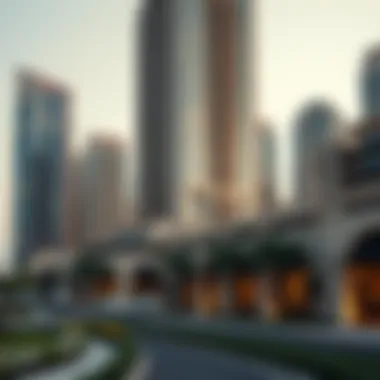
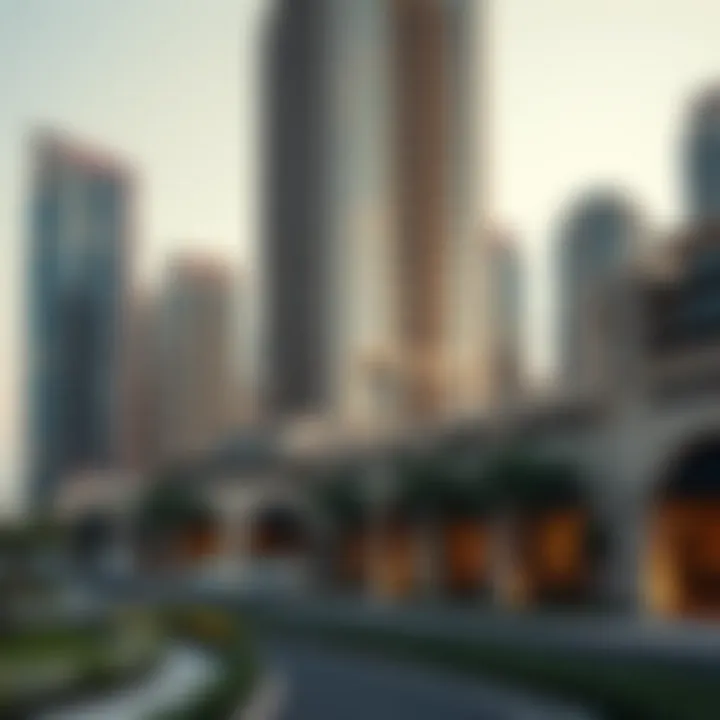
Moreover, as a part of its strategic vision, the Dubai government has introduced several initiatives to attract foreign investment, including long-term visas for property investors and favorable taxation policies. Such measures enhance the investment climate, making it an attractive destination for both local and foreign investors.
Regulatory Environment for Buyers
Navigating the regulatory landscape is crucial for any prospective buyer in Dubai. The government has structured laws to protect property buyers while fostering a transparent and secure environment for investment. One significant regulation is the requirement for a property ownership title deed, which ensures that the buyer has legitimate ownership and clear rights to the property.
Furthermore, foreign investors can own up to 100% of residential property in designated areas. This openness is one of the key drivers of foreign investment. However, it’s important to be aware of other considerations, such as annual property taxes, service fees, and the rules governing property rentals—all crucial factors that can influence returns.
Buyers are recommended to engage with licensed real estate agents who understand the nuances of the market and can provide valuable advice. Seeking legal counsel also helps in comprehending contracts and avoiding potential pitfalls.
Post-Pandemic Recovery: Market Resilience
The post-pandemic phase has been a testament to Dubai's resilience in its real estate market. Against the backdrop of global downturns, Dubai has demonstrated remarkable recovery, driven by factors such as an influx of expatriates, the reopening of tourism, and ongoing government support.
Real estate prices have rebounded, with many areas seeing a rise in value, indicating sustained demand. The government’s proactive measures to stimulate the economy, combined with initiatives like the Expo 2020, have bolstered investor confidence, making Dubai an attractive investment haven.
Additionally, rental yields remain high compared to many global cities, drawing investors seeking consistent income streams. As the world shifts towards a new normal, Dubai's adaptability and commitment to innovation remain strong, evident in its ever-evolving landscape that balances tradition with modernity.
Investors who are keen on the long-term prospects of Dubai's property market can find opportunities that were once thought impossible, particularly as the city seeks to become a hub for global business and tourism.
In summary, the real estate landscape in Dubai is not just a sector; it's an ecosystem that thrives on opportunity, adaptability, and resilience. Scholars and investors alike recognize that this vibrant market is a barometer for the city's overall economic health, making it an essential area of focus for anyone interested in what Dubai has to offer.
Connectivity and Infrastructure
Understanding Connectivity and Infrastructure is central to grasping what makes Dubai tick. As a global hub, Dubai's connectivity is not just about transportation; it's the lifeblood of trade, tourism, and cultural exchange. High-quality infrastructure facilitates the seamless flow of people and goods, enhancing its stature on the world stage. The benefits of a robust infrastructure in Dubai are numerous:
- Accessibility: Dubai International Airport, one of the busiest in the world, connects millions of travelers annually, making it easy for visitors to arrive from across the globe.
- Efficiency: Well-planned public transport options, including the Metro, tram systems, and a network of roads, mean that both residents and tourists can move swiftly through the city.
- Growth Catalyst: Infrastructure improvements often spur economic development, attracting businesses and investments.
Transportation Networks: Efficiency in Motion
Transportation in Dubai is more than just getting from point A to B; it’s a testament to planning and engineering prowess. The Dubai Metro, for instance, is an iconic feature. It is one of the longest driverless metro lines in the world, featuring:
- High-speed trains that ensure minimal waiting times.
- Frequent services that accommodate a large volume of passengers.
- Integration with other transport modes like buses and water taxis, providing seamless travel across the city.
Moreover, the road networks are designed with precision, easing congestion and linking various neighborhoods to commercial centers. The rental car market also thrives, bolstered by ride-sharing apps that offer convenient options for residents and visitors alike.
Smart City Initiatives: Embracing Technology
In recent years, Dubai has positioned itself as a smart city, investing heavily in technology to enhance living standards. These initiatives aim to harness data and technology for public benefit. Some key efforts include:
- IoT infrastructure: Sensors and devices monitoring traffic conditions, air quality, and public safety.
- Mobile apps that simplify utility management, public transport navigation, and community services.
- Smart lighting and waste management, reducing operational costs and environmental footprints.
Such technological advancements are not only about convenience; they contribute to a more sustainable urban environment, making daily life smoother for residents and tourists alike.
Sustainability Efforts: Future-Proofing Dubai
Sustainability is a cornerstone of Dubai’s long-term vision. The city's leadership recognizes the importance of balancing rapid development with environmental responsibility. Notable sustainability efforts include:
- Green building standards: Regulations such as the Estidama Pearl Rating System encourage energy-efficient construction.
- Investment in renewable energy: Projects like the Mohammed bin Rashid Al Maktoum Solar Park aim to produce significant portions of Dubai's energy from clean sources by 2030.
- Waste management programs: Initiatives aimed at recycling and minimizing landfill waste are pushing Dubai toward a greener future.
Incorporating sustainable practices helps Dubai ensure that it remains a livable city amidst growth pressures and a changing climate.
The infrastructure that underpins Dubai’s operations is not merely functional; it is strategically crafted to uphold the city’s reputation as a futuristic metropolis.
By examining the nuances of connectivity and infrastructure, it becomes clear that this facet of Dubai is integral to both its current success and future prospects. With ongoing investments and a vision for innovation, Dubai is well on its way to being a model for cities worldwide.
Culmination: The Future of Dubai
As one looks towards the horizon, Dubai’s future reveals itself as a tapestry woven with ambition, innovation, and resilience. This city, which has already claimed a prominent spot on the global stage, continues to evolve at a breath-taking pace. Understanding the trajectory of Dubai is crucial for investors, expatriates, and other stakeholders keen to tap into its potential.
Firstly, sustainability will dominate Dubai's future narrative. The government has committed to reducing its carbon footprint and has embarked on a journey of transforming the city into a green oasis. Initiatives like the Dubai Clean Energy Strategy 2050 aims to ensure that 75% of its total energy output will stem from clean resources. This focus not only paves the way for environmentally conscious developments but also enhances the city’s appeal to eco-minded investors and residents.
Moreover, tech integration is set to rise. Smart city projects aim to embed technology in everyday infrastructure and services. From public transport to utilities and even law enforcement, Dubai is leveraging the Internet of Things (IoT) and big data to create an interconnected urban fabric. This integration is not merely futuristic; it creates a seamless living and working environment, making the city even more attractive for businesses looking to establish a base in the Middle East.
The real estate market also promises an exciting future. With anticipations of increased demand driven by demographic shifts and a positive regulatory backdrop, there’s room for growth. Recent trends indicate a robust appetite among expatriates and international buyers, stemming from factors like zero income tax and high-quality living standards. Crafting innovative residential and commercial units to meet evolving preferences and needs will secure strategic market positioning for developers.
In the realm of tourism and hospitality, Dubai holds an influential place as a global tourist hotspot, and that isn’t expected to change anytime soon. Several mega-events, such as Expo 2020 and upcoming cultural festivals, will further bolster its standing. Efforts to diversify offerings, from adventure tourism in the desert to luxury retreats on the coastline, will keep drawing in visitors. This influx not only benefits local businesses but also translates into more sustainable economic growth.
In closing, the future of Dubai encapsulates a promise of excellence amid constant change. To grasp the underlying currents that shape this metropolis is to hold an invaluable insight into opportunities lying ahead. Investors and stakeholders who can recognize and adapt to these dynamics will not only benefit from Dubai’s ongoing transformation but will be part of its remarkable story.
"Dubai’s trajectory is not just about the destination; it’s about the journey itself, marked by daring dreams and tangible achievements."
For more insights and continued updates on Dubai’s developments, visit reputable resources such as Wikipedia and Britannica.



